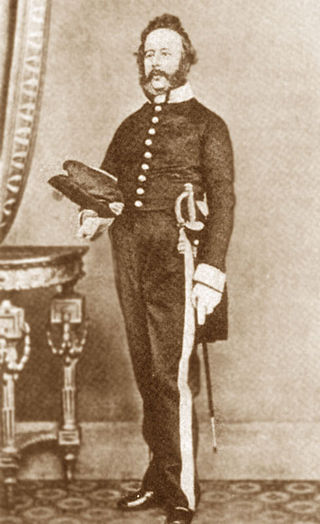Top Qs
Timeline
Chat
Perspective
James Finn
British diplomat From Wikipedia, the free encyclopedia
Remove ads
James Finn (1806–1872)[1] was a British Consul in Jerusalem, in the then Ottoman Empire (1846–1863).[2]
This article needs additional citations for verification. (August 2012) |
Remove ads
Biography
Summarize
Perspective
James Finn arrived in Palestine 1845 with his wife Elizabeth Anne Finn. Finn was a devout Christian who belonged to the London Society for Promoting Christianity Amongst the Jews, although he did not engage in missionary work during his years in Jerusalem.

Finn was a great believer in productivity, an ideology very much in vogue at the time. In 1853[dubious – discuss] purchased for £250 Karm al-Khalil (Arabic for "Abraham's Vineyard", lit. "vineyard of the loved one", which in Hebrew became Kerem Avraham) a barren piece of land outside the walls of the Old City.
On this land, Finn established an agricultural training farm for Jews. The idea was providing the means for them to become productive citizens. In 1855, he employed Jewish labourers to build a home for himself there, now located in Jerusalem's Geula neighborhood.[3] It was the third building constructed outside the walls of the Old City.[4] Finn also built cisterns for water storage and a soap factory that produced high quality soap sold to tourists.
Finn also helped establish an experimental farm for poverty-stricken Jews from Jerusalem in the village of Artas outside Bethlehem.
Remove ads
Consular career
Finn was removed from his post in 1863. His superiors believed he had become too personally involved in local affairs. His insolvency and clashes with Samuel Gobat, the Protestant Bishop of Jerusalem, also contributed to his removal.[5][6]
Books (partial list)
Summarize
Perspective
By James Finn
In chronological order of the first publication.
- The Jews in China, London: Wertheim, 1843. -University of Hong Kong Libraries, Digital Initiatives, China Through Western Eyes
- Byeways in Palestine, London 1868, 482pp.
- Byeways in Palestine, Adamant Media, Boston, 2002 reprint of the London 1868 original. 482pp. ISBN 1-4021-9272-X
- The Orphan Colony of Jews in China. Containing a letter received from themselves, with the latest information concerning them. London: James Nisbet, 1872.
- Stirring Times: Or Records from Jerusalem Consular Chronicles of 1853 to 1856., Edited by Elizabeth Anne Finn. vol. 1. London 1878. The full text, archive.org, Original: Harvard. Can download PDF.
- alternative: the full text, archive.org, original: University of Michigan. Can download PDF.
- Stirring Times: Or Records from Jerusalem Consular Chronicles of 1853 to 1856., Edited by Elizabeth Anne Finn. vol. 2. London 1878. The full text, archive.org, Original: Harvard. Can download PDF.
- alternative: the full text, archive.org, original: University of Michigan. Can download PDF.
By Elizabeth Anne McCaul Finn
- A Home in the Holy Land. A tale illustrating customs and incidents in modern Jerusalem. Adamant Media, Boston, 2002 reprint of the London 1866 original. ISBN 978-1-4021-1768-8
- A Third Year in Jerusalem. A tale illustrating customs and incidents of modern Jerusalem; or, a sequel to "Home in the Holy Land". Adamant Media, Boston, 2002 reprint of the London 1869 original. ISBN 978-1-4021-1053-5
See also
References
External links
Wikiwand - on
Seamless Wikipedia browsing. On steroids.
Remove ads

